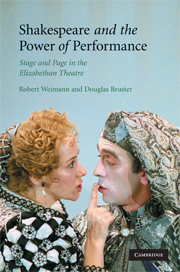Book contents
- Frontmatter
- Contents
- Acknowledgments
- Introduction
- Chapter 1 “Moralize two meanings” in one play: contrariety on the Tudor stage
- Chapter 2 Performance, game, and representation in Richard III
- Chapter 3 Mingling vice and “worthiness” in King John
- Chapter 4 Clowning: agencies between voice and pen
- Chapter 5 Clowning at the frontiers of representation
- Chapter 6 Cross-dressing and performance in disguise
- Chapter 7 Personation and playing: “secretly open” role-playing
- Chapter 8 Character/actor: the deep matrix
- Chapter 9 Character: depth, dialogue, page
- Chapter 10 King Lear: representations on stage and page
- Notes
- Index
- References
Chapter 4 - Clowning: agencies between voice and pen
Published online by Cambridge University Press: 22 September 2009
- Frontmatter
- Contents
- Acknowledgments
- Introduction
- Chapter 1 “Moralize two meanings” in one play: contrariety on the Tudor stage
- Chapter 2 Performance, game, and representation in Richard III
- Chapter 3 Mingling vice and “worthiness” in King John
- Chapter 4 Clowning: agencies between voice and pen
- Chapter 5 Clowning at the frontiers of representation
- Chapter 6 Cross-dressing and performance in disguise
- Chapter 7 Personation and playing: “secretly open” role-playing
- Chapter 8 Character/actor: the deep matrix
- Chapter 9 Character: depth, dialogue, page
- Chapter 10 King Lear: representations on stage and page
- Notes
- Index
- References
Summary
The Tudor Vice was not, of course, the only inherited agent through which the Elizabethan theatre adapted “matter of worthiness” to public performance. Next to the Renaissance descendant of the allegory of evil, and certainly related to him, stood the clown and, at a further remove, the fool. Despite their obvious dissimilarities, an element of kinship joined these sinister and comic agents of contrariety. They shared the open, playhouse-conscious, and quickening space of the early modern stage, especially when addressing the spectators, anticipating their responses, and insinuating their complicity. Far from contenting themselves with representing verbally prescribed meanings, they could both play upon and “mistake the word.” Such was indeed their “old vice still” (The Two Gentlemen of Verona, 3.1.284). Given this punning on topsy-turvy verbal action, Elizabethans must have recognized the similar play on words when Thomas Nashe referred to Will Kemp as “jest-monger and Vice-gerent general to the ghost of Dick Tarlton.” No doubt the kinship of Clown and Vice was marked by much flux and instability. We need only recall The Book of Sir Thomas More and the manner by which speech headings for Inclination – the Vice and leading player in the drama's interlude – were transformed into, simply, “clo.” for Clown.
Owing to its complexity, the “Clown's ancestry in the Tudor ‘Vice’” cannot be addressed here in anything like the manner it deserves.
- Type
- Chapter
- Information
- Shakespeare and the Power of PerformanceStage and Page in the Elizabethan Theatre, pp. 77 - 98Publisher: Cambridge University PressPrint publication year: 2008



